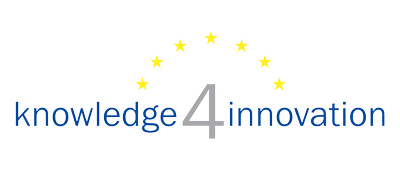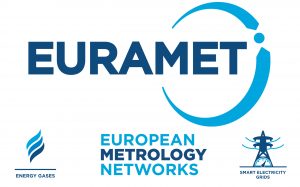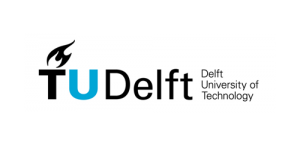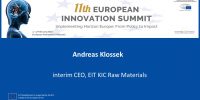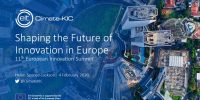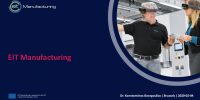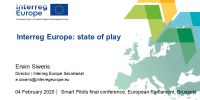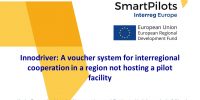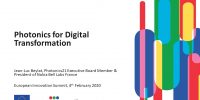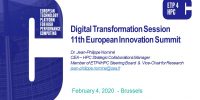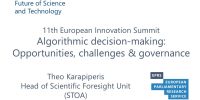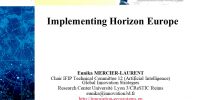The themes of the plenary sessions related to the newly established working groups under the Pact4Innovation which will continue their activities during the coming years: Digital Transformation, Greening, Implementing Horizon Europe and From Lab to Market.
11th European Innovation Summit: From Policy to Impact
Innovation is a key driver for Europe’s sustained growth, protection of values and making transitions towards a carbon free and highly digitised society, for business and citizens. Europe shows leadership in some domains (such as the Green Deal), while ensuring to at least keep pace with our global competitors in other domains (such as the platform economy, Artificial intelligence). The EU efforts and programmes need to move well beyond the ‘business as usual’ to delivering real pan European and global impact. For more than a decade K4I has fostered the debate on innovation aiming at better innovation policies based on stakeholder needs.
From 3 – 5 February, more than 400 innovation actors and policy makers gathered at the 11th edition of the European Innovation Summit in the European Parliament in Brussels to discuss remaining challenges during the final negotiation and adoption process of Horizon Europe, the role of the EIT/KICs in driving innovation across Europe as well as a number of more specific topics further described below.
For the K4I Community and in particular those that are part of the planned European Partnerships, the discussions revealed a shared need for an implementation strategy that would maximise impacts, ensure transparency and simplification, foster synergies with other EU funding instruments and ease access through better communication and outreach.
Overview of the events
The K4I Forum Chair, Maria da Graça Carvalho, welcomed the participants at the Opening Ceremony accompanied by statements of MEPs Susana Solís Pérez, Lina Gálvez Muñoz and Victor Negrescu who took office the same day, all of which are K4I political members.
Alina-Stefania Ujupan, on behalf of Executive Vice-President for ‘A Europe fit for the Digital Age’, Matgarethe Vestager, shared the vision of her Commissioner to focus on bridging the gap from innovation to implementation and society with the Summit attendees. Robbert Fisher, president of K4I, closed the session saying that Europe may well lag behind in certain domains, but is strong and leads in others, it should move out of the comfort zone of the underdog, and act and build on its strengths.
The next morning started with a conference session on ‘How the EIT KICs will Shape the Future on Innovation in Europe’ setting out the EIT’s vision, key objectives and added value in the European innovation landscape in light of Horizon Europe and the Commission proposals for an ‘EIT Regulation and Strategic Innovation Agenda’ currently under revision by the European Parliament.
The event was followed by two lunch debates. The first one done in cooperation with EURAMET, focused on The EU’s Energy transition and on how research and innovation is helping Europe to become the world’s first climate-neutral continent. In parallel, industry experts and researchers exchanged viewpoints on ‘Building Synthetic Cells in Europe – Understanding Life and Mimicking Cell Mechanisms for a Revolution in Green Technology’ in a discussion organised in cooperation with TU Delft.
The first session of the afternoon, entitled ‘ Shift2Rail, Shift2Green’ explained the plans of the European rail sector to play a key role in implementing the Commission’s Green Deal ambitions and how the Joint Undertakings S2R and FCH drive innovations that deliver the needed solutions.
The day continued with a session on ‘Digital Transformation: Economics, Sovereignty, Security’ organised in cooperation with Photonics21 that debated in which technological areas and why we need to keep or achieve digital and technological sovereignty. The session addressed some of the barriers as well as the skills needed to master the transformation process.
In the conclusion of the first day, together with SmartPilots, an INTERREG Europe project, the way to ‘Boost European Bio-economy Innovation Deployment by Smart Interregional Cooperation’ was presented and discussed.
The third and last day of the Summit started with a breakfast discussion on ‘How to Empower Women via investment to increase Innovation Finance Opportunities in Europe’. “The most interesting event ever in the European Parliament” (according to one of MEPs present) gathered 19 female entrepreneurs and 5 male participants around the table. As only 2% of VC provided investment goes to women led startups, there is a long way to go and a large potential to be tapped.
During the following session ‘Implementing Horizon Europe’, members of the Commission as well as of the European Parliament, together with a wide variety of EU Horizon project beneficiaries as well as beneficiaries from Canada, Switzerland and Australia addressed a number of challenges that are still under discussion, the budget for Horizon Europe and the impact it is expected to create, being on top of the agenda as well as the full participation and inclusion of all EU member states.
Finally, the Summit concluded with two sessions organised in cooperation with the European Federation of Nurses: a session on ‘European Electronic Health Records – Digitisation In The Healthcare Sector’ and a dinner debate on ‘Nursing Now! Digitalization in the healthcare sector: end-user co-design!’ that addressed the policies and steps to be undertaken to further digitalise the European Health & Care sector and make progress in the area of Electronic Health Records.
Throughout the Summit, the need for setting a new level of ambition to strengthen Europe’s innovation capability, taking leadership and moving faster from policy to impact became evident as the solution to keeping the EU at the forefront of global research and innovation.
